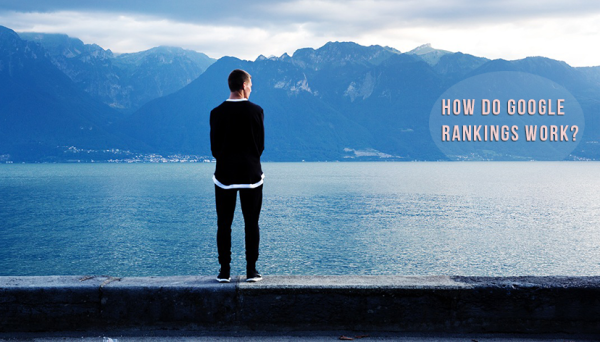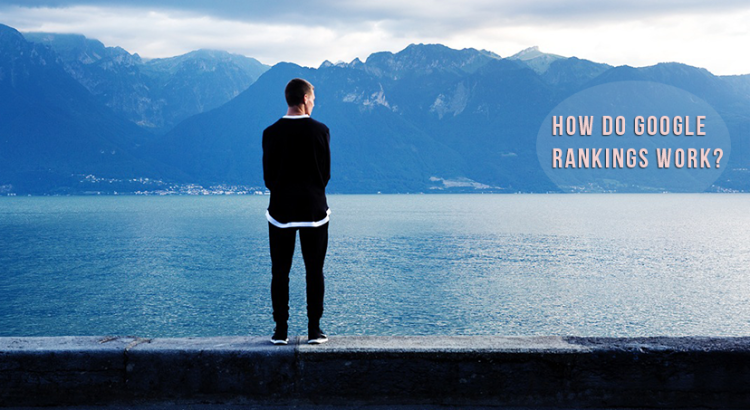Getting your website ranked on the first page means you’ll get targeted traffic and a higher conversion rate.
Most Internet users will click on the first, second, or third link they see on search engine results pages.
This is why many business owners do everything they can to get ranked in those spots for the keywords their consumers are using on search engines.
Understanding how Google rankings work will help you set up your site and market it in a way that will increase your chances of reaching the top of search engine results pages.

Spider Bots – Google’s Tool
First you should learn how Google Search works.
Google uses spider bots to crawl websites.
Every time a website has an update, the spider bot notices it, and runs some tests on it. These tests help the bot rank the site’s newest content. These tests come from an algorithm Google has created to find out which sites are better than others are under the same niche and keywords.
Once the spider bot has analyzed the new page of content, it will continue to other parts of the site to make sure there isn’t anything else that needs to be ranked for the first time.
It will also retest the existing pages to make sure they are still ranking where they should according to the algorithm.
Whenever you make a change on your site, the spider bot will eventually find it. One trick you should know is that the spider bot loves new content. The more content you publish, the more times the spider bot will come. There are some websites that are crawled every few minutes because that’s how often they have new information. These sites are usually news related and getting the pages ranked as soon as possible is important.
Getting Your Pages Highly Ranked
You now know how Google crawls your site and how it ranks new content pages. All that’s left for you to do is make sure the spider bot likes the pages you’re publishing. Keep these tips in mind as you’re publishing new content on your site.
- High quality content is top priority. You must provide the information your consumers want and need. If people don’t find what they are looking for on your site’s pages, Google will not rank your pages highly on results pages because it doesn’t want to send anyone else to your site.
- Keywords still matter in content. You need to research the keywords consumers are using and then use them on your webpage. You will need to put them in the page title, meta tags, and throughout the text. Don’t go overboard using keywords because Google does recognize spam and can penalize you for it. Then you’ll have to learn how to recover from a Google penalty; of course, after you check to see if you have a Google penalty.
- Optimize images with keywords related to your content. When you use images, you should make sure the title and description of the image contains the keywords you’re using in the content. The images should be clear and relevant to what the page is about.
- Include a contact page on your site. Google wants Internet users to have the information they need to feel comfortable buying from your site.
- Update your site as necessary. You need to make sure your site is easy to navigate, doesn’t have any broken links, and the content is not outdated. I suggest you perform a content audit on your site just to make sure.
How Social Media Plays a Role in Google Ranking
Social media has taken center stage in Internet marketing. Millions of people are on social networks and business owners have followed those people onto those networks because they must adapt to consumers. Google knows that people are getting a lot of their information from Facebook, Twitter, and other social networks, so it’s using those sites as indicators on how they should rank websites.
Hint: this is especially true for Google+. Think about it. Having a lot of shares on Google’s social network would likely give you a nice bump on Google’s search results.
Spider bots crawl social networking sites almost constantly because of all the new information on them. When the bots find links to your site, it follows them. That’s how they first find out your site has new content sometimes.
However, just finding new content isn’t the only thing spider bots do. They also pay attention to how many people have liked and shared the link with their followers. The more likes and shares the link receives, the more the spider bot likes your new page. The more the bot likes your new page, the higher it gets ranked on results pages.
Conclusion
As you can see, Google has a system when it comes to ranking websites. They are always making adjustments to it to ensure they are providing the very best websites to their users. As long as you strive to provide the best website to your consumers, you will see your site climb Google rankings.
Tell us in the comments what else you recommend for ranking highly on Google search engine results pages. What has worked for you?
